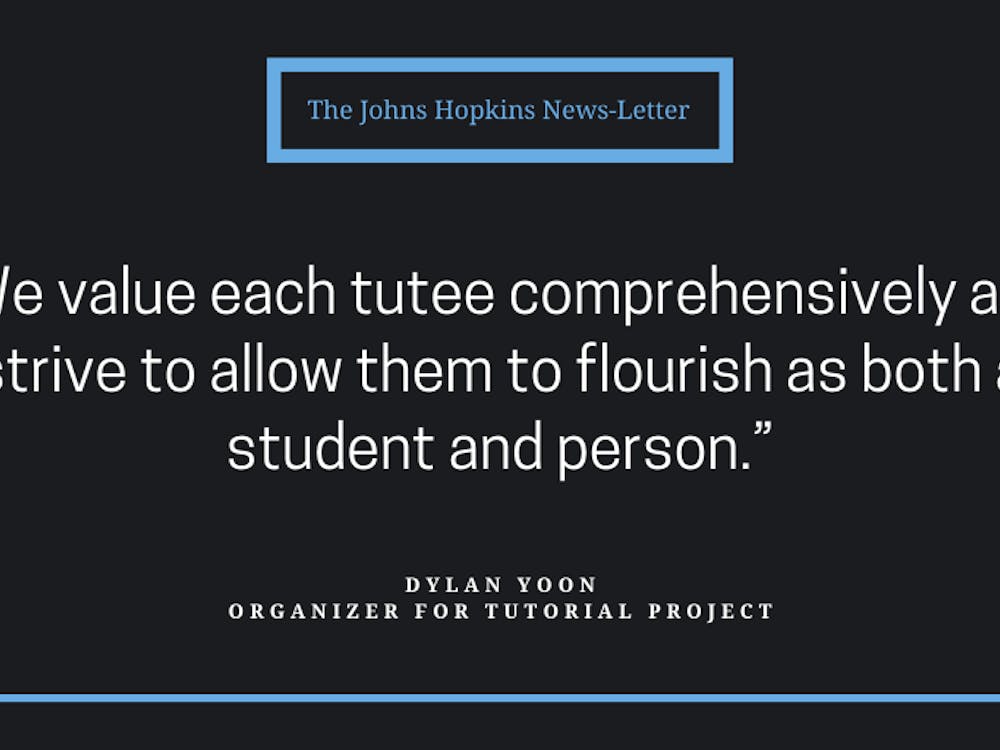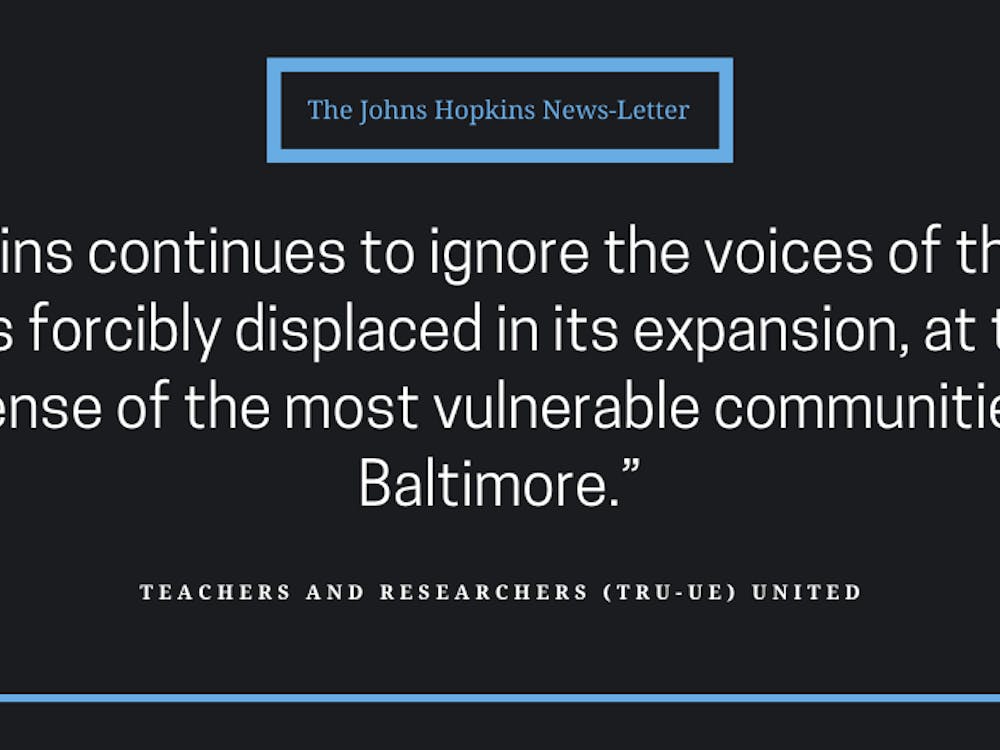Hopkins Voice for Choice, a pro-choice student group, hosted a discussion on women’s reproductive rights after a talk given by Ohio Governor John Kasich on Monday. Kasich’s visit was part of the Milton S. Eisenhower Symposium (MSE) 2017 speaker series.
During the open discussion hosted by Voice for Choice, students responded to Kasich’s talk and shared their opinions on abortion.
Emeline Armitage, president of Voice for Choice, led the discussion. She said that she decided to host the event to create a space for people who disagree with Kasich.
“We wanted to have a space to have some sort of anti-Kasich time because obviously, as we learned tonight, he’s not very good at answering questions and he’s not very good at remembering what bills he signed, or speaking,” she said.
Armitage believes that there is a disconnect between Kasich’s branding by the media as a moderate conservative politician and some of the legislation he has helped pass in Ohio.
“His brand is someone who is able to go across the aisle, and I think that branding kind of obfuscates what his policies have actually been about,” she said. “He has passed some of the harshest anti-abortion laws in the country.”
Junior Matthias Gompers also participated in the discussion. He agreed that Kasich’s policies often did not match his rhetoric.
“Kasich has branded himself as a moderate and that works really well for anyone who is not super informed,” he said.
In 2016, Kasich vetoed the Heartbeat Bill, which would have banned abortions after six weeks in Ohio. Around the same time, he passed a bill which banned abortions after 20 weeks in Ohio. According to Armitage, the Heartbeat Bill contradicted Supreme Court rulings such as Roe v. Wade, and would have been declared unconstitutional had Kasich signed it.
Armitage noted that these policies show how Kasich is actually a conservative politician.
“He had this six-week bill which got all this media attention and then he vetoed it. He looked like a hero, but at the exact same time he passed a 20-week ban,” she said. “So it was a very sneaky sleight of hand.”
Armitage believes that this is reflective of a larger trend in which abortion rights are being revoked through stricter regulation instead of outright bans.
One example is the 24-Hour Informed Consent Law, which requires women to spend 24 hours in the town where the abortion takes place, creating financial burden for many women.
Armitage listed the potential financial costs of having an abortion, including paying for travel, child care and medical care, as well as taking time off of work.
She also noted that 49 percent of abortions in the United States are performed on women who live below the poverty line.
“I think it’s a form of eugenics where we purposefully are trying to get poor people not to have children by not treating them well, by not giving their children appropriate care... and then once they’re pregnant, it’s like ‘no, you have to have the baby’,” she said.
Sophomore Alex Walinskas also participated in the discussion. She explained that she is pro-choice because she believes that the life of a woman is more valuable than that of a fetus.
“My intuitive philosophy is that I value a person, and I think it is worth more to [be] a woman... who has been alive, and has things to lose... than something that I wouldn’t even consider a developed person,” she said. “I personally don’t think that’s putting me in a spot to say I don’t value life.”
Walinskas also explained that there are many physical risks associated with pregnancy.
“It’s just an inconsiderate perspective to assume that being pregnant is just something you can do,” she said. “There’s a lot that can happen with pregnancy.”
Gompers noted that many policies disproportionately affect lower-income women and that one must consider the implications that pro-life policies have.
“If you are pro-life then you support policies that disadvantage women, specifically poor women,” he said. “You have to look at the effects of the policies you support. Politics doesn’t happen in a vacuum.”
One audience member mentioned that Kasich supports abortions in the cases of rape, incest or if the life of the mother is at risk. Armitage argued that this was not evident in some of the laws that Kasich has helped pass.
“He’s very good in his rhetoric of saying he cares about the life of the mother, I don’t think it’s reflected in his policies. I think that’s kind of been the theme of this discussion so far, trying to differentiate between rhetoric and policies,” she said.
Gompers believed that Kasich’s pro-life stance is incongruous with his support of capital punishment. Alva Campbell is an Ohio man with terminal lung cancer, who is on death row for first degree murder. Activists have urged Kasich to pardon Campbell.
“He was talking about the importance of every individual life, cherishing and protecting that,” he said. “I don’t see that coming through when he puts a man with terminal cancer on death row to be executed. That’s a cognitive dissonance, an inconsistency in logic.”
Sophomore Louisa Kishton attended the post-Kasich discussion because she wanted to hear different opinions on abortion rights.
“Women’s sexual health is really important to me... I was hoping there would be some sort of debate and there was. It was good to hear other people’s viewpoints and their questions,” she said.
Freshman Sonomi Oyagi also enjoyed that students who held pro-life and pro-choice views on abortion attended the talk.
“I think it was a pretty healthy debate,” she said. “But, they had some points that I think mainly were more kind of general philosophical questions that people can’t really answer as a group.”
Sophomore David Saveliev appreciated the event for providing him with the opportunity to discuss reproductive rights with students who have differing viewpoints than he does.
“I liked that [pro-life students] showed up, and I enjoyed having an actual discussion with them,” Saveliev said. “I like that we are able to engage with people from different sides of the argument. It’s really good for discourse.”
Freshman Nicola Sumi Kim liked that the speakers used facts and statistics to support their views on abortion rights and did not just rely on emotional accounts.
“I was surprised at the amount of fact that was brought up rather than feeling, because abortion is often considered a very emotional and personal thing,” she said. “I appreciated the use of fact that was then merged with what they felt later on.”
Sarah Y. Kim and Alyssa Wooden contributed reporting.
Editor’s Note: Emeline Armitage is a frequent contributor to the Opinions Section. She was not involved in the reporting of this piece.























Please note All comments are eligible for publication in The News-Letter.